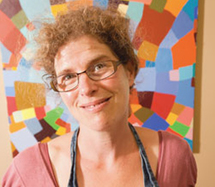 Photo Credit: Matthew Thorson
Photo Credit: Matthew Thorson I did not choose to live in a racist world – none of us did – but it is our responsibility to change it. As a white person, I believe that it is my responsibility more so than those who are being persecuted by racism. This is not so I can be the noble white woman, coming to help those in need. It is because my freedom is tied to your freedom. If my liberation is resting on someone else’s oppression and I don’t work to address that, then I am disconnected from humanity and on a journey of slow spiritual death. This is not the same as the literal death that racism causes, but it is dehumanizing in its own way.
I am honored to serve as the Executive Director of the Peace & Justice Center and to have been invited to participate in Vermont Stage’s TalkBack Thursday panel for The Mountaintop. I grew up here in Burlington and my family did not talk much about race and racism. I knew I was against racism, but I did not know that I benefited from it. In my late teens I started my journey of actively unlearning racism and realized how little I knew. I thought diversity would help me and when I was thinking about having kids, I wanted to raise them somewhere more racially diverse. But a friend it was pointed out that, wherever I landed, racism would exist and it would be my responsibility to talk about it with my kids. This was one of those “a-ha” moments that seem so obvious in retrospect.
I have two kids with my partner Jules, both white, 11 and 8 years old. We live in Burlington and we talk to them about race and racism regularly. It isn’t easy – I sometimes don’t know how to say things, I’m sometimes missing information, and the topic itself is horrifying. Three concepts have been instrumental in my process of unlearning racism and I’ll share them here:
1. white privilege
2. white fragility
3. and what I call the “language of race and racism”
There are white people who say that they are not privileged because they are poor, queer, or otherwise oppressed. There are others who claim that they work hard and have earned what they have. Neither of these are untrue. But it is also true that all white people have racial privilege. It is sometimes helpful to replace the work “privileged” with the word “advantaged.” When we look at indicators like life expectancy, education, wealth, or health, certain racial groups are disadvantaged. Others are then, by definition, advantaged. I do work hard and I have endured hardships, but each of these hardships would have been harder were I not white.
The language of race and racism is simply that – words and phrases used to discuss these things. As someone who did not grow up talking about race and racism regularly, these phrases don’t always come easy to me. It is like learning any new language. If I were to learn Portuguese, I would expect to make mistakes, feel awkward, and improve with time. The same is true for the language of race and racism. As beginners, it feels forced and we say things wrong. I can improve but will never become fluent. My children, however, who are growing up with it in their vocabulary, might. This gives me much hope and definitely motivates me.
White fragility is a concept that I recently learned about as articulated by Robin DiAngelo, professor of multicultural education at Westfield State University. It is easiest to describe as a self-perpetuating cycle as follows:
- We live in an unequal culture.
- Racism is taught as individual acts, not systems of oppression.
- When white people are told that they are benefiting from or participating in a racist system, they become defensive and feel attacked.
- The feeling of attack creates a physiological response that might include increased heartrate, increased blood pressure, sweaty palms, and shaking.
- This is real and scary and leads white people to limit when and how to talk about race and racism.
- Thus, with the conversation limited, inequality is upheld.
This idea of white fragility leads me to commit even more to talking about race and racism when it makes me shake, when I’m scared I’m going to say the wrong thing, and when I think I’m going to expose a shortcoming of mine. If I don’t make mistakes and recognize them, I won’t improve. As I improve, hopefully I am equipping my kids to carry this movement further than I can ever hope to. If I don’t push myself forward through the fear, I am accepting the discomfort of others and benefiting from it.
The Peace & Justice Center has several workshops in our Racial and Economic Awareness Initiative including the following:
- How to Talk to Kids About Racism
- “The New Jim Crow” Book Discussion
- Building Empathy and Eliminating Oppression: a Deep Look at Racial and Religious Prejudice
- Privilege and Accountability: Becoming an Ally



